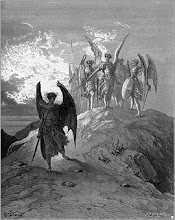Hold the phone there's a third group that make an appearance, the people of Jared, an off-shoot of the famed tower of Babel debacle. We get a light sprinkling of their dealings with God and each other. Take a look at the table of contents, and unless my math is wrong which is often the case, of the 531 pages in the BoM, 31 are dedicated to the Book of Ether (which is an abridged record of said peoples' history). That's roughly 5 percent, not the largest morsel on offer, but still important enough to garner a special mention on the title page and hopefully tasty all the same.
The account of the people of Jared then, no matter how sparse, requires special consideration, then again so does the entirety of the BoM as the final sentences of this paragraph goes on to explain. You've got to love the vagaries of the English language "which is to show" (highlighted above) functions as an indexical here and like all bad indexicals it's not immediately obvious what it is referring to (or maybe I'm just being obtuse). It could mean that the record of the people of Jared, or the confusion of languages at the tower of babel, but most likely that the record which constitutes the Book of Mormon is or was written to illustrate that Jesus is God (an interesting idea that will be explored in another post) and the anointed of God and that He will manifest this fact to the world.
I am therefore left to use the discernible intent of the author as the lens by which I go about my (for lack of a better word) deconstruction/commentary/annotation of the BoM. Moroni's purpose was to show the divinity of Jesus and His interactions with the people in the BoM. Lets see where that takes us.






